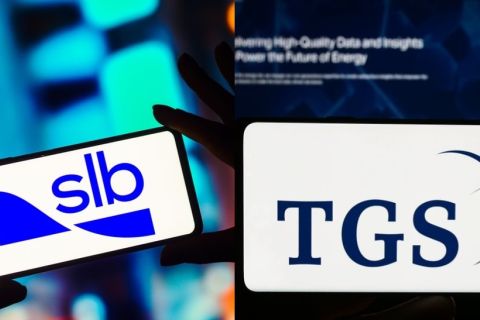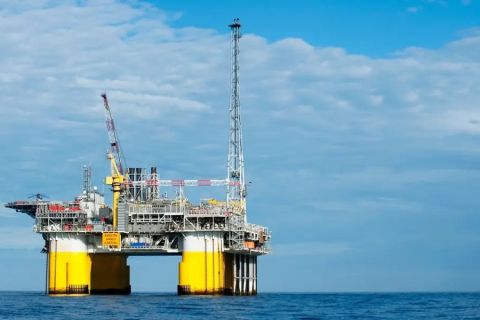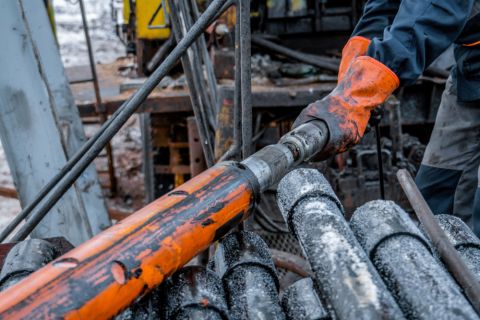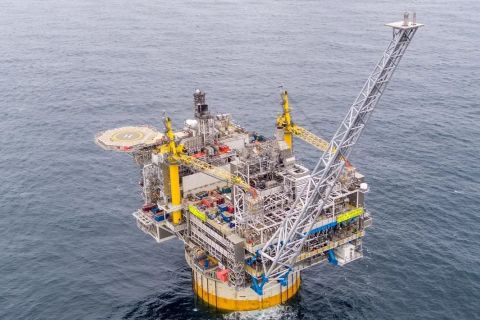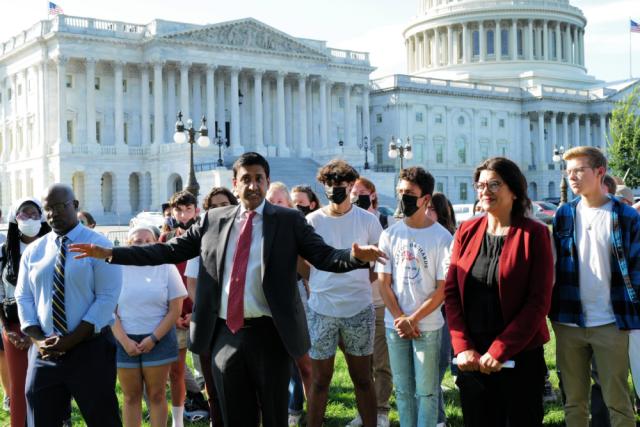
Rep. Ro Khanna (D-CA), pictured center, attends a demonstration at the Capitol in September to address the environmental impact of the infrastructure bill. Khanna hopes the bill he introduced on Dec. 13 will be adopted into the Senate’s version of the Build Back Better Act (BBBA), the budget reconciliation bill. (Source: Phil Pasquini / Shutterstock.com)
California lawmaker Ro Khanna introduced a bill into the U.S. House of Representatives on Dec. 13 that would prevent investors from securing carbon capture and sequestration tax credits if the carbon is used to boost oil production.
The bill has little chance of being adopted into law, but reflects deep political divisions in Congress over whether and how carbon capture can be used as a tool in the fight against climate change.
The tax credit, known as 45Q, allows companies to earn money for every ton of carbon that they capture off a polluting facility and store underground. That includes carbon injected into oil fields to push trapped oil out of the ground, something the industry calls EOR.
Khanna’s bill would revise 45Q by eliminating any credit for captured carbon used for EOR, which environmentalists say defeats the purpose of carbon capture by promoting the carbon-intensive fossil fuels industry.
Currently, 95% of carbon capture and storage (CCS) capacity in the U.S. is for EOR, according to data from the Global CCS Institute.
“We shouldn’t be subsidizing [EOR] if this is going to be increasing carbon,” Khanna told Reuters. “If the technology advances, we can consider it.”
The bill, titled the End Polluter Welfare for Enhanced Oil Recovery Act, is co-sponsored by Raul Grijalva of Arizona, chair of the House Natural Resources Committee, and Mike Quigley of Illinois, both Democrats like Khanna. It is supported by 20 green groups including Food & Water Watch, the Sierra Club and Sunrise Movement.
Khanna hopes the bill will be adopted into the Senate’s version of the Build Back Better Act (BBBA), the budget reconciliation bill. The House passed its version of the bill in November.
But the provision would be a significant departure from the House version, which includes a major expansion to the 45Q credit.
According to media reports, several senators, including West Virginia’s Joe Manchin, whose vote is needed to pass BBBA, have been discussing eliminating a provision of 45Q that requires facilities to capture at least 75% of their carbon emissions to qualify.
“They’re going the wrong way,” Khanna said of his Senate colleagues.
Recommended Reading
TGS, SLB to Conduct Engagement Phase 5 in GoM
2024-02-05 - TGS and SLB’s seventh program within the joint venture involves the acquisition of 157 Outer Continental Shelf blocks.
2023-2025 Subsea Tieback Round-Up
2024-02-06 - Here's a look at subsea tieback projects across the globe. The first in a two-part series, this report highlights some of the subsea tiebacks scheduled to be online by 2025.
StimStixx, Hunting Titan Partner on Well Perforation, Acidizing
2024-02-07 - The strategic partnership between StimStixx Technologies and Hunting Titan will increase well treatments and reduce costs, the companies said.
Tech Trends: QYSEA’s Artificially Intelligent Underwater Additions
2024-02-13 - Using their AI underwater image filtering algorithm, the QYSEA AI Diver Tracking allows the FIFISH ROV to identify a diver's movements and conducts real-time automatic analysis.
Subsea Tieback Round-Up, 2026 and Beyond
2024-02-13 - The second in a two-part series, this report on subsea tiebacks looks at some of the projects around the world scheduled to come online in 2026 or later.

